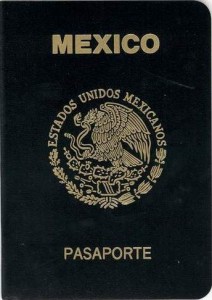
A Mexican passport. Mexico could soon be added to the Canadian government’s list of visa-exempt countries
Canada has had problems with large numbers of refugee claimants arriving in the country from countries that it has made visa-exempt, in particular Hungary.
Almost all of these claimants end up being rejected by the Refugee Board or abandoning their claim, but not before receiving thousands of dollars worth of welfare and free health care courtesy of the federal government.
One Canada Border Services Agency (CBSA) study estimates each bogus refugee claimant costs Canada $50,000, resulting in hundreds of millions of dollars of extra costs for the Canadian economy each year due to fraudulent refugee claims.
One measure that could help reduce the problem of bogus refugee claims from visa-exempt countries is the new ‘mini-visa’ that Canada will soon be introducing, which will require individuals from visa-exempt countries excluding the U.S. to acquire a Canadian Electronic Travel Authorization (ETA) online before boarding their flight to Canada.
The mini-visa will enable Canadian authorities to screen out failed refugee claimants, ending the problem of a merry go-round of deportees returning to Canada to make new claims that take months to process and reject.

